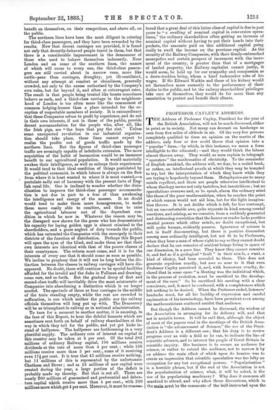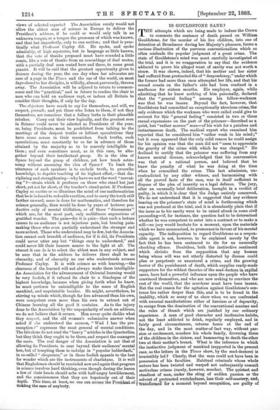PROFESSOR CAYLEY'S ADDRESS.
THE Address of Professor Cayley, President for the year of the British Association, will not be much discussed, either in print or in society. Not many can descant on landscape as seen from five miles of altitude in air. Of the very few persons completely qualified to form an opinion on the merits of the
address, only four or five could throw that opinion into a " popular " form,—by which, in this instance, we mean a form intelligible to the educated ;—and they would think the labour almost thrown away. They would as soon explain to telegraph "operators" the mathematics of electricity. To the remainder of English mankind, the address will, we fear, be a sealed book, or rather, an intellectual puzzle at which they may be tempted to try, but the interpretation of which they know while they are trying is hopelessly beyond them. Metaphysics are to many minds repellent, and there are people otherwise intellectual to whom theology seems not only tasteless, but innutritious ; but no speculations overawe and, so to speak, alarm the ordinary mind like those of the pure mathematician, when he reaches the point at which reason would not aid him, but for the light imagina- tion throws. It is not dislike which is felt, far less contempt, but an uncomfortable awe, quite separate in kind among mental emotions, and arising, as we conceive, from a suddenly generated and distressing conviction that the hearer or reader lacks positive mental powers which other minds, no doubt exceptional, but still quite 'human, evidently possess. Ignorance of science is not in itself disconcerting, but there is positive discomfort among men ordinarily intelligent, but not fit to be Professors, when they hear a man of whose right to say so they cannot doubt declare that he can conceive of sentient beings living in space of one dimension, in a pure line. They know they cannot conceive it, and feel as if a geological " fault " in their minis, a want, a kind of idiotcy, had been revealed to them. This does not generate repulsion exactly, but awe so near to it that even Professor Cayley perceived it, and, with humorous cruelty, de- clared that in some cases "a Meeting was the individual which, in the process of evolution, must be sacrificed to the develop- ment of the race." So he sacrificed his meeting with a clear conscience, and, it must be confessed, with a completeness which left nothing to be desired. When the Professor ended, listeners' headache must, for all his lucidity of expression and careful explanation of his terminology, have been prevalent even among the mathematicians scattered amidst that audience.
But though the Address cannot be discussed, the wisdom of the Association in arranging for its delivery will, and that not in amiable terms. It will be said that, although the object of most of the papers read in the meetings of the British Asso- ciation is "the advancement of Science," the use of the Presi- dent's Address is a different one ; that his duty is to review progress over as wide a field as he can, to indicate the line of scientific advance, and to interest the people of Great Britain in scientific inquiry. His business is to secure an audience for science, or rather to extend the audience, not to narrow it by an address the main effect of which upon its hearers was to create an impression that scientific speculation was too lofty an occupation for any but exceptional powers. " Popularisation " is a horrible phrase, but if the end of the Association is not the popularisation of science, what, it will be asked, is the use of its popularising machinery ? Why does it summon all mankind to attend, and why allow those discussions, which in the main pat* he the comments of the half-instructed upon the
views of selected experts? The Association surely would not allow the ablest man of science in Europe to deliver the President's address, if he could or would only talk in an unknown tongue, or a tongue the grammar of which was known, and that but imperfectly, only to one section; and that is prac- tically what Professor Cayley did. He spoke, and spoke admirably, of high mysteries, but in language so little known, that the vote of thanks proposed must have sounded a little comic, like a vote of thanks from an assemblage of deaf mutes, with a partially deaf man seated here and there, to some great pianist. It will be said that the greatest opportunity given to Science during the year, the one day when her advocates are sure of a page in the Times and the ear of the world, on most days closed to her disciples, is wilfully, almost perversely, thrown away. The Association will be adjured to return to common- sense and the "practical," and in future to confine the chair to men who can hold an audience rapt, or induce all Britain to consider their thoughts, if only for the day.
The objectors have much to say for themselves, and will, we suspect, prevail; and yet those who listen to them, if not they themselves, are conscious that a fallacy lurks in their plausible rebukes. Carry out their view logically, and the greatest men in Science could never be selected as Presidents of the year, or, being Presidents, must be prohibited from talking to the meetings of the deepest troths or loftiest speculations they have come across in their researches. Such truths, such speculations, must constantly be so far in advance of those attained by the majority as to be scarcely intelligible to them ; and even sometimes must, as in this case, be alto- gether beyond their intellectual grasp. So is the idea of Space beyond the grasp of children, yet how teach astro- nomy without assuming the idea of Space ? To limit the utterance of such speakers is to exclude truth, to proscribe knowledge, to deprive teaching of its highest effect,—that dis- ciplining and strengthening—why have we not the word " nervat- ing "F—strain which it produces on those who stand but just short, yet not far short, of the teacher's stand-point. If Professor Cayley so excites or so illumines the mind of one mathematician that he is induced to redouble exertion, and to carry the torch still farther onward, more is done for mathematics, and therefore for science generally, than would be done by years of lectures pro- ductive only of mental titillation, or of those "discussions" which are, for the most part, only mellifluous expressions of gratified wonder. The pain—for it is pain—that such a lecture causes to an audience is not injurious pain, but bracing pains making those who even partially understand the stronger and more ardent. Those who understand may be few, but the Associa- tion cannot seek breadth of audience, for if it did, its Presidents could never utter any but "things easy to understand," and could never lift their hearers nearer to the light at all. The utmost it can do is to select the ablest man in any subject, and be sure that in the address he delivers there shall be no obscurity, and of obscurity no one who understands accuses Professor Cayley. It is with science as with learning,—the clearness of the learned will not always make them intelligible- An Association for the advancement of Oriental learning would be very foolish, if it refused its chair to a Sinologae of the highest knowledge, because when giving forth what he knew, he must perforce be unintelligible to the mass of English mankind, and unprintable besides. He might, nevertheless, be stirring up minds which, though fax less advanced than his own, were competent even more than his own to extract out of Chinese learning all the good it contains. As to the injury done to the Association by the unpopularity of such an address, we do not believe that it occurs. Men never quite dislike what they respect, and the old woman's submissive answer when asked if she understood the sermon, "Wad I hae the pre- sumption ?" expresses the most general of mental conditions. The frivolous do not read the " heavy " articles in the Quarterlies, but they think they ought to be there, and respect the managers the more. The real danger of the Association is not that of allowing its Presidents to soar beyond their audiences' mental ken, but of tempting them to indulge in "popular balderdash," in so-called "eloquence," or in those foolish appeals to the lust for wonder which are the instruments of charlatans. It is well that Englishmen should be reminded now and again that progress in science involves hard thinking, even though during the lesson a few of their heads should ache with half-angry bewilderment, and the consciousness that they are hopelessly out of their depth. This tune, at least, no one can accuse the Preaident of tickling the ears of anybody.



































 Previous page
Previous page